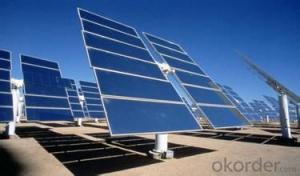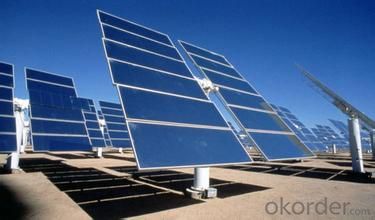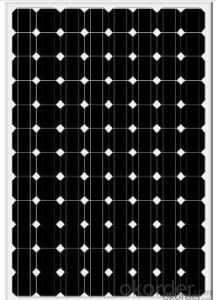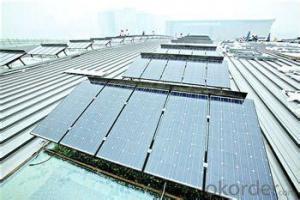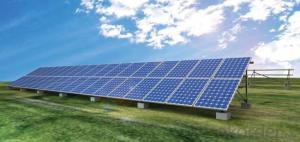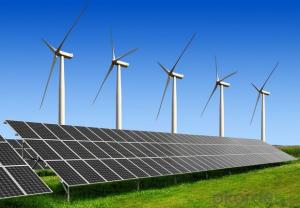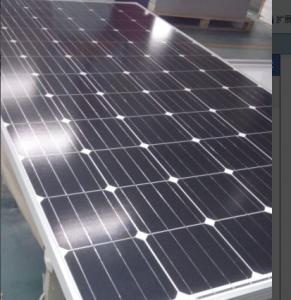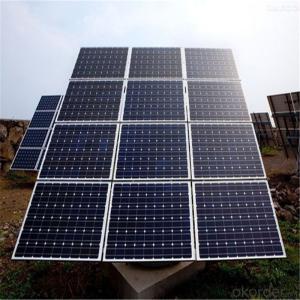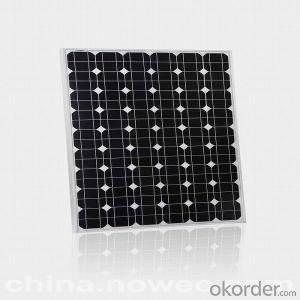South Carolina Solar Panels - High Efficiency Solar Panel Solutions
- Loading Port:
- Shanghai
- Payment Terms:
- TT OR LC
- Min Order Qty:
- 2600 watt
- Supply Capability:
- 26000 watt/month
OKorder Service Pledge
OKorder Financial Service
You Might Also Like
Specification
Product Description:
1.Structure of Solar Module Description
Solar panel refers either to a solar hot water panel, a common type of a solar thermal collector, or to one or more solar photovoltaics (PV) modules, electrically connected and mounted on a supporting structure.
A PV module is a packaged, connected assembly of typically 6×10 solar cells. Solar PV panels constitute the solar array of a photovoltaic systemthat generates and supplies solar electricity in commercial and residential applications. Each module is rated by its DC output power under standard test conditions, and typically ranges from 100 to 320 watts. The efficiency of a module determines the area of a module given the same rated output – an 8% efficient 230 watt module will have twice the area of a 16% efficient 230 watt module. There are a few solar panels available that are exceeding 19% efficiency. A single solar module can produce only a limited amount of power; most installations contain multiple modules. A photovoltaic system typically includes a panel or an array of solar modules, an inverter, and sometimes a battery and/or solar tracker and interconnection wiring.
2.Main Features of the Solar Module
1).High conversion efficiencies resulting in superior power output performance.
2).Outstanding power output even in low light or high temperature conditions
3).Optimized design for ease of soldering and lamination
4).Long-term stability,reliability and performance
Specification of Solar Polycrystalline(270W-290W)
CNBM Solar photovoltaic (PV)module is designed for large electrical power requirements. It is the optimal choice for both on-grid and off-grid power systems. CNBM Solar panel offers high performance of power per square foot of solar array.Poly- or multicrystalline silicon(poly-Si or mc-Si): made from cast square ingots — large blocks of molten silicon carefully cooled and solidified. Poly-Si cells are less expensive to produce than single crystal silicon cells, but are less efficient. US DOE data shows that there were a higher number of multicrystalline sales than monocrystalline silicon sales.
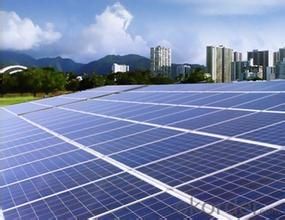
FAQ
We have organized several common questions for our clients,may help you sincerely:
①What price for each watt?
It depends on the quantity, delivery date and payment terms,
②What is your size for each module? Can you tell me the Parameter of your module?
We have different series of panels in different output, both c-Si and a-Si. Please take the specification sheet for your reference.
③Can you provide the peripheral products of the solar panels, such as the battery, controller, and inverter? If so, can you tell me how do they match each other?
Yes, we can, we have two companies for solar region, one is CNBM International, the other is CNBM engineering Co.
We can provide you not only the solar module but also the off grid solar system, we can also provide you service with on grid plant.
④What is your warranty system?
Our product performance guarantees for 25 years
• 12 years guarantee for workmanship
• Timeliness of delivery
• Quality Products certified (TÜV, UL, CE, ISO)
⑤How do you pack your products?
We have rich experience on how to pack the panels to make sure the safety on shipment when it arrives at the destination.
⑥ Can you do OEM for us?
Yes, we can.
⑦How long can we receive the product after purchase?
In the purchase of product within three working days, We will arrange the factory delivery as soon as possible. The pecific time of receiving is related to the state and position of customers.Commonly 7 to 10 working days can be served.
- Q: how much would you pay for a 2'x4' solar panel that puts out 24 volts and 74 watts?
- Try okorder
- Q: If you need 9400 watts, 75 amps@ 240V, how many solar PV panels do you need?
- 75 amps @ 240VDC is 8,000 watts.
- Q: Do solar panels produce noise?
- No, solar panels do not produce noise as they generate electricity without any moving parts.
- Q: can u use a light bulb instead of the sun to power a solar panel
- Yes, but why? If you've got the light-bulb, you've already got more electricity than you will get out of the solar panel.
- Q: Plz also label the price for the panel. I want a small panel but can produce a sufficent amount of energy. thank you :)
- You might try Lowes Home Improvement. Or the yellow pages. Or Solar Panels R US.
- Q: Can solar panels be installed on a library or educational institution?
- Yes, solar panels can be installed on a library or educational institution. In fact, installing solar panels on such buildings is a great way to promote renewable energy and reduce carbon emissions. It not only helps to lower electricity bills but also serves as an educational tool, teaching students and visitors about the benefits of solar power and sustainable living.
- Q: Since plants have been populating this earth for the past 475 million years I think they have evolved to gain the most sun with their greenery. If scientists used heat sensors to find the hot spots of trees and trim all of the leaves that don't quot;providefor the plant, then maybe that trimmed tree could be used to become a solar quot;panelquot;. I believe that each individual leaf could be replaced by a small solar panel and the wood of the tree would be wiring that would root all of the solar panels to a generator.
- From the vantage point of a scientist and an engineer, you have a whole host of problems to overcome. The mass of solar cells cannot be supported by most leaves much less allow the leaves to turn toward the sun as they naturally do. The wood and other structures of a tree are terrible conductors and wouldn't serve as efficient power transmitters. There are issues of damaging the health of the tree by interrupting the process of photosynthesis in favor of solar energy collection, and many other issues. However, I can tell you that solar power does use several principals that you have observed in trees. For example, solar collectors are almost always oriented to face toward the sun. Many adjust with the time of day and seasons to be optimally oriented to collect the sun's rays. Much like leaves in many plants are not static but change position to optimize their angle to the sun. Also, many solar cells are now designed with a membrane structure which offer several advantages. So you see many of your observations have found their way into practical application in solar power production.
- Q: I am starting to think about solar panels as an option for my home. I have done some research on panels, to be honest its all very confusing. There are many different panels some with 60 watts some all the way up to 20 watts. My household currently uses about 2700 to 3400 kWh every two months. So based off of my power usage maybe you can answer some of the following questions:What kind of panels should I be looking at?Which panel manufacturers give the best bang for the buck (reliable/affordable)?Anything else I should be concerned about?I am just starting out in educating myself on solar power so please excuse me if I sound very naive. Any information that you may have will be helpful. Thanks in advance.
- Unfortunately, I can't give you a lot of specifics on what you should use. However, I can tell you that the very best system for you simply might not be available to you, in which case it really doesn't matter how good it is. Your best bet would be to talk to a supplier in your area and see what is available, THEN start looking at the differences between those. Unfortunately, solar panels aren't quite to the point of being a common-place product...yet. Another thing to consider would be how old your roof is. You might want to look into the possibility of building-integrated materials if you are in need of a new roof. Talking with somebody who sells the panels in your area will help you understand a lot more than just doing raw research. Get their take on it, then fact check and research what they tell you so you know you're not getting ripped off.
- Q: i took some solar yard lights apart and put them together in a series. i was told if you take AMPS times VOLTS = WATTS. do you test it with ac volt or dc volts? I tested mine with dc volts and got 4 volts in good sun and had my meter set on Ma or milliamps and got .83 which i am asuming that is .83 of one amp now i took those and multiplied .83 times 4 volts to = 34.03 watts. Is this large enough to charge a car battery in a day? And doese it make a difference for amps on how fast it charges or watts. i also was looking around and found 30 watt panels but had higher amps. I am very interested in building solar panels but i realize i dont know what i need to do to make shur they are big enough. my panel is only 9inch by 0 inch. It seems weird that i am putting out 4 volts
- If a car battery contains 50 amp hours of charge at 2 volts, that's 600 watt hours of energy. divided by 34.03 watts, 7.63 hours to charge completely in direct sunlight. You don't want to connect them all in series. You want about 4 or 5 volts to charge a 2 v battery, so you should connect groups in parallel, and connect those groups in series to make your voltage. You'll end up with the same amount of power, lower volts and higher amps. It will work for trickle charging your battery if it's not too far run down.
- Q: Can solar panels be used in areas with frequent lightning storms?
- Yes, solar panels can be used in areas with frequent lightning storms. However, it is recommended to take certain precautions to minimize the risk of damage. These precautions include installing surge protection devices, grounding systems, and lightning arrestors to divert the lightning strike's energy away from the solar panels. Additionally, using high-quality equipment that meets safety standards can also help mitigate potential damage caused by lightning strikes.
Send your message to us
South Carolina Solar Panels - High Efficiency Solar Panel Solutions
- Loading Port:
- Shanghai
- Payment Terms:
- TT OR LC
- Min Order Qty:
- 2600 watt
- Supply Capability:
- 26000 watt/month
OKorder Service Pledge
OKorder Financial Service
Similar products
Hot products
Hot Searches
Related keywords
